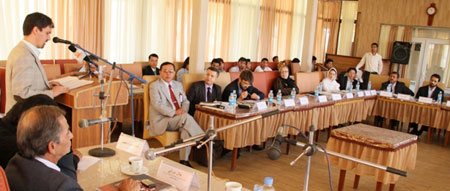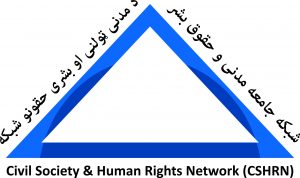28-June- 2010- Kabul- Afghanistan
By: Seyar Lalee
The second analytical symposium on access to information and its role in the promotion of democracy and human rights in Afghanistan organized on 28-June-2010 by Civil Society and Human Rights Network. The goal of the symposium was to create a  constructive dialogue for common understanding on access to information with some members of parliaments, civil society and media organizations. The symposium was divided into tow parts. The first part of the program allocated for official speeches on the importance of access to information in Afghanistan.
constructive dialogue for common understanding on access to information with some members of parliaments, civil society and media organizations. The symposium was divided into tow parts. The first part of the program allocated for official speeches on the importance of access to information in Afghanistan.
The representatives of Afghan government, parliament, board of Civil Society and Human Rights Network, Afghanistan Independent Human Rights Commission, UNAMA and Civil Society and Human Rights Network secretariat delivered official supportive speeches on access to information program in Afghanistan.
The second part of the Symposium was conducted to discuss three key
articles by Afghan members of the parliament;
 The first article was presented by Mr. Abas Noyan member of National Assembly of Afghanistan. The article (access to information role on good governance) dealt with access to information as a useful tool for fostering good governance culture in Afghanistan . Mr. Abas main argument were the followings;
The first article was presented by Mr. Abas Noyan member of National Assembly of Afghanistan. The article (access to information role on good governance) dealt with access to information as a useful tool for fostering good governance culture in Afghanistan . Mr. Abas main argument were the followings;
Access to information strengthens the organic relationship between citizens and states, both citizens and state understand each other by having information about state’s source and abilities.
Access to information is a civil rights of citizens. By having access to information, the citizens exercise its civil rights to decide properly about his or her daily life and future.
Access to information is a responsibility of public administration. By disseminating of information public administration creates transparency and accountability for its mechanisms. At the end of Mr. Noyan presentation the participants debated his article. Generally the participants of symposium supported the arguments which were explained by the presenter. The main concerns of participants were focused on understanding of access to information goal and the responsibility of Afghan authorities. Mr. Noyan reaction was positive to the questions by explaining the role of parliament in monitoring of law implementation in Afghanistan.
 The second presenter was Mis. Fouzia Kufi the member of the parliament from Badakhshan province. Mis. Kufi article was about (access to information role in bringing transparency and accountability). By having an overview to the history of access to information in Afghanistan , she criticised the government of Afghanistan during to last several decades. She said that access to information culture was not respected by any former Government of Afghanistan, the culture of hiding information isolated Afghan citizens to participate in state building processes in Afghanistan. She said that some political regimes have used the terminology of access to information in their programs however no one of them treated Afghan citizens appropriately relating to access to information. She supported the Civil Society and Human Rights Network initiative to work in draft law on access to information. In her presentation she emphasized the positive role of access to information in combating corruption and other kinds of organised crimes in the state structure. She said that access to information provides accountability. It’s high time to work for access to information in Afghanistan.
The second presenter was Mis. Fouzia Kufi the member of the parliament from Badakhshan province. Mis. Kufi article was about (access to information role in bringing transparency and accountability). By having an overview to the history of access to information in Afghanistan , she criticised the government of Afghanistan during to last several decades. She said that access to information culture was not respected by any former Government of Afghanistan, the culture of hiding information isolated Afghan citizens to participate in state building processes in Afghanistan. She said that some political regimes have used the terminology of access to information in their programs however no one of them treated Afghan citizens appropriately relating to access to information. She supported the Civil Society and Human Rights Network initiative to work in draft law on access to information. In her presentation she emphasized the positive role of access to information in combating corruption and other kinds of organised crimes in the state structure. She said that access to information provides accountability. It’s high time to work for access to information in Afghanistan.
The third presenter was Mis.Sabrina Sagheb Member of Parliament. Her article was about (access to information and human rights). She brought eight elements to be considered for implementation of access to information law.
• The information should be précised, credible and impartial;
• The information should be based on confident sources;
• There should be definition of information (commercial, social needed, political and other kind of information);
• Wrong and false information should not be disseminated;
• Information should not be complicated and ambiguous (should be simple and understandable);
• Information should be on time and accurate.
 Mis. Sabrina Sagheb expressed her support to the access to information program. According to her the majority of members of the parliament in Afghanistan will support the access to information drafting law because members of parliament are suffering from lack of information in their daily work. Both presentations received many questions and reaction by the audiences. The participants asked both presenters how to improve the relationship of civil society and Afghan parliament? How to work better in order to facilitate legal procedures for access to information law?
Mis. Sabrina Sagheb expressed her support to the access to information program. According to her the majority of members of the parliament in Afghanistan will support the access to information drafting law because members of parliament are suffering from lack of information in their daily work. Both presentations received many questions and reaction by the audiences. The participants asked both presenters how to improve the relationship of civil society and Afghan parliament? How to work better in order to facilitate legal procedures for access to information law?
Both presenters responded to the questions by saying that the process of legitimizing of access to information is very well organised by Civil Society and Human Rights Network because Civil Society and Human Rights Network organized constructive dialogues in the different part of the country. During the symposium Mr. Kawa Sahab the member of the working group of drafting access to information law presented the main elements of the draft law. At the end of the symposium participants approved a message of the second symposium of access to information.

